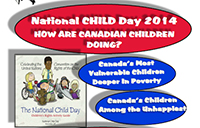It has been 25 years since the United Nations Convention on the Rights of the Child (UNCRC), the most widely ratified international agreement in history, came into being. Canada was a major contributor to the drafting of the agreement as well as an early signatory to it. On Nov. 20, National Child Day, York University’s Children’s Studies program will host an information session asking how Canadian children are faring in relation to the rights contained in the UNCRC.
 National Child Day celebrates the UN’s adoption of the 1959 Declaration of the Rights of the Child and the 1989 Convention on the Rights of the Child. The information session will take place from noon to 3pm in the Senior Common Room, 010 Vanier College, Keele campus. All interested students and faculty are welcome.
National Child Day celebrates the UN’s adoption of the 1959 Declaration of the Rights of the Child and the 1989 Convention on the Rights of the Child. The information session will take place from noon to 3pm in the Senior Common Room, 010 Vanier College, Keele campus. All interested students and faculty are welcome.
From noon until 1pm, faculty from the Children’s Studies program will report on UNICEF’s Report Card 11, “Child Well-Being in Rich Countries,” which concludes that Canada is a “nation stuck in the middle” of industrialized countries when it comes to children’s well-being, with Canadian children being “among the unhappiest” of children in these countries, as well as the recently released Report Card 12, “Children of the Recession.”
Although Canada weathered the 2008 recession better than most countries, slightly reducing the number of children living in poverty in Canada, the most vulnerable children have sunk further into deep poverty. And Canada has only reduced child poverty from 23 to 21 per cent, while Norway reduced its child poverty from 10 to five per cent. As the “Canadian Companion” to UNICEF’s Report Card 12 points out, “The distance between Canada’s child poverty rate at 21 per cent and Norway’s at five is considerable – but not inevitable.”
From 1 to 3pm, those gathered at York will join a live webcast from Ottawa with the Landon Pearson, O.C., a longstanding leader in fighting for children’s rights in Canada, and Judy Finlay, Ontario’s Child Advocate from 1991-2007 and a professor at Ryerson University. This session is co-hosted by the Youth Justice and Strategic Initiatives Section and the Family Children and Youth Section at the Department of Justice Canada. The presenters will share information and personal experiences relating to the history of the UNCRC in the Canadian context; key UNCRC provisions relating to the protection of children from harm; and the importance of the UNCRC for vulnerable youth in Canada, especially those who are involved in the child welfare and youth justice systems, and those who have experienced violence and exploitation.
Pre-registration is required to view this live webcast, which will not be accessible after the event. The broadcast will be bilingual and participants will have an opportunity to send questions via email to the speakers during the webcast in both official languages. For more information about National Child Day and other events taking place across Canada, visit the Public Health Agency of Canada website.
For more information, contact Peter Cumming, coordinator, Children’s Studies program, at cummingp@yorku.ca or ext. 60498.
The webcast speakers:
Landon Pearson is a longtime advocate for the rights and well-being of children. From 1994 to 2005, she served in the Senate of Canada, where she became known as the children’s senator as well as the senator for children. In May 1996, she was named advisor on children’s rights to the minister of foreign affairs. In 1998, she became the personal representative of the prime minister to the 2002 United Nations Special Session on Children. Pearson then coordinated Canada’s response to the Special Session, entitled A Canada Fit for Children.
Upon her retirement from the Senate in 2005, Pearson moved with all her documents and papers to Carleton University, where she directs a Resource Centre for the Study of Childhood and Children’s Rights that has been established in her name.
Judy Finlay’s current research includes Mamow Ki-ken-da-ma-win: Enhancing social determinates of health through a partnership-based approach to child, family and community wellness in First Nations in northern Ontario. As principal investigator, she leads a team of researchers from across three universities (Ryerson, Western University and Lakehead).
Finlay is the co-chair of Mamow Sha-way-gi-kay-win: the North South Partnership for Children in Remote Northern Communities. This is a partnership that represents the coming together of First Nation chiefs, elders, youth and community members living in 30 remote communities in northwestern Ontario and individuals and voluntary organizations based in southern Ontario. She is an appointed member of the Child and Family Services Review Board with the Ontario Government. She was also Ontario’s child advocate from 1991-2007.


